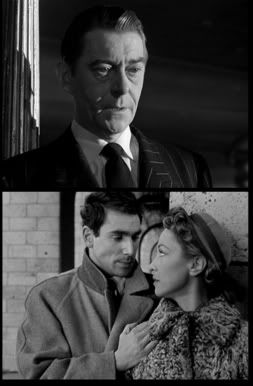The below is vaguely spoiler ridden. I'm gonna black out random bits - it probably won't spoil your enjoyment significantly, but then again I've a friend who looks at me blankly if I say "shower scene". Makes me want to see Psycho just so I can make her see it and cure her of ignorance towards what's surely the most famous scene ever...
Anyway, a chap spoke for a bit, gave away half the plot and made the following amusing comment on the music - "the zither, sometimes haunting, sometimes atmospheric, sometimes plain irritating." And then the film began - big screen and all!
Whoa! I loved it. To a certain extent, I was playing cinematic join the dots (zither-ferris wheel-cuckoo clock-penultimate five minutes). But as usually transpires with that game, I actually knew very little indeed. One thing I did not expect was the humour. The plot is bleak as anything; but there's some very funny lines in there, and the music keeps everything bubbling on in a cheery way. It's one of those cases where the soundtrack changes the perspective on the film. It's a lighter, trivial touch that stops the morally messed tale becoming unremittingly dark. And it was pretty bad even as it was - two friends who really don't know each other well enough, which they learn to their cost. Betrayal - it's a subject close to my heart. At a basic level, you've got to sympathise with something in a film, have a point of reference. Bridget Jones' Diary, for example, was loved by so many because they saw themselves and their own problems in the story. I quite enjoyed it - but I've always been thin, never had love troubles, never been 30 and single so the film had less resonance for me. But friendship's something I do understand, and from that standpoint the tale's a total killer. Proper spoilerness here ---->Nobody really wants Harry to be caught. He's kind to his cat - the Vito factor. I liked the cat, I'm glad it survived - that scene was sweet.
Holly wanders around like a sherrif in one of his cheap novels, clearly out of his depth. He really does not have a clue, and chats happily about his discoveries - and more crucially, his sources of information - to whomever is passing, even if they're obviously up to no good.
I suppose Holly never really betrayed his Harry, the man he thought he knew. He defended him very loyally, and it was only when irrefutable proof of the penecillin thing came out he doubted. It's almost like Harry betrayed his trust first. He wasn't aware of what his friend was capable of. Though Harry makes the same mistake - he has this childlike trust in his friend, he doesn't imagine he'll hand him over. That city's probably to blame - it makes them both go sour.
You've got to feel sorry for Holly, though, who's basically a nice chap given a horrible choice. In my opinion he does the wrong thing, but that's just me. And you can argue that he did do the right thing, and that he was very brave to do so - goodness knows I'd never be able to.
...philosophical debate on this scale is only ever caused by a film which has really touched me. Anything this morally mushed was always gonna succeed in my book. Watch it for the snappy script, if nothing else...
Now when you're finished watching, and if you've got an imdb account, take a look at this post:
http://www.imdb.com/title/tt0041959/board/nest/21411086
as it's jolly funny and I want to join!
Oooh, forgot to mention the cinematography! Ah well, it was great and it brings me neatly onto my next point. Our Film Studies class has finally sat down to filmwatch - at least, a clip. We're looking at lighting this week, so we watched a dream sequence from Dead Again - a film I'd never heard of, but notable for lots of low key lighting and the prescence of the lovely Andy Garcia. Drools. Those light effects really brought out his cheekbones...anyway, in case you're interested, here's basically what we learned:
| Most films pay a great deal of attention to lighting, to create a certain mood or draw attention to things. Whether it's backlighting (ramming the light behind (duh) the character and sillouhetting them), using bright key lights for melodramatic effect or a bunch of filler lights to soften shadows...stop fidgeting and pay attention you at the back- this took my Film Studies prof an hour and a half to explain this morning. Anyway, this can be boiled down to low-key and high-key lighting. High-key is very naturalistic; low-key involves exciting contrasts between light and dark. To illustrate this, here's two screenshots from the great Rififi. Now as you can probably tell pretty easily, the top shot of Tony is low-key with that bright light from the left creating threatening shadows, while the bottom shot is definitely high key. And while on the subject of Rififi, I just need to remind you that a) it's a fantastic film b) it's being remade and c) the only reason I haven't started ranting properly and issuing death threats is Al Pacino's involved. Should be interesting... |








2 comments:
man, i want to see the third man, i've heard great things, I just keep on forgetting I want to see it.
--RC of strangeculture.blogspot.com
It's well well worth it.
Post a Comment